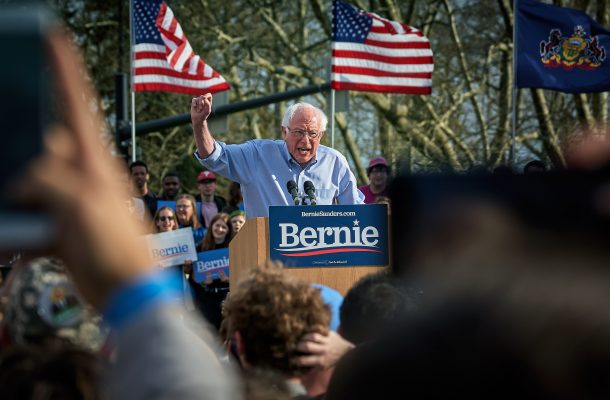Arvanitakis on American politics: Can the Democrats win?

The Nevada Democratic debate held this week saw the candidates ‘take the gloves off’ by attacking their rivals and asserting their authority – as a result, things got very interesting.
This was driven by a number of factors. First and foremost, has been the rise of Michael Bloomberg who has spent hundreds of millions of dollars of his own money on political advertising that, combined with name recognition, has seen a surge in his popularity. In fact, leading up to Nevada, he managed to sit in second place on national opinion polls in terms of being the Democratic presidential candidate.
Bloomberg’s surge in popularity meant that the other candidates had to move to stop his momentum while responding to their own challenges. Elizabeth Warren, for example, had seen her popularity stagnate and she had fallen well behind Bernie Sanders and Pete Buttigieg. A strong showing before ‘Super Tuesday’ was fundamental in keeping her campaign alive.
Sanders and Buttigieg had momentum after strong showing in the earlier caucuses but needed to keep their momentum. Biden’s campaign has been described as being on ‘life support’ and, as such, had to break his downward spiral. Amy Klobuchar had been on an upward trajectory which she had to maintain.
Bloomberg stumbles in the line of fire
With so much on the line, it was no wonder that the ‘things were a lot more aggressive with Michael Bloomberg being the main target.
It took Elizabeth Warren less than three minutes to begin a concerted attack on Bloomberg’s record as New York Mayor including ‘stop and frisk’ which disproportionately target Black Americans and other minority groups, his record of sexist comments and running a company with a historically toxic working environment for women.
This was an opening for other candidates to mount attacks on Bloomberg that did not stop throughout the night.
While Warren seemed to be the clear winner, the rest of the candidates would have been overall satisfied with their performance – except for Bloomberg that is. Just how bad Bloomberg performed is best summarised by the New York Times’ Gil Duran:
“Bloomberg’s not a leading candidate — he just plays one in TV ads. When he wasn’t taking blows, he was invisible. His answers on racism and sexism were awful. Money can’t buy charisma — or humility. Historically bad debate performance.”
Bloomberg seemed under-prepared. While frequently portrayed as the Democrat’s answer to Trump, he was anything but outspoken and did not set the pace. In contrast to Trump’s outlandish strategy, claims and behaviour in the 2016 Republican debates, Bloomberg seemed to think his name recognition alone would carry him – it didn’t.
The question being asked by many here in the United States is whether any Democratic candidate can defeat Trump. While these are all incredibly smart, charismatic and impressive candidates, there exists a defeatist attitude within many Democratic circles.
Can any Democrat defeat Donald Trump?
Though I am not writing off the Democrats, here are four important reasons why the Party is struggling to gain traction with American voters and President Trump is likely to be in the White House for four more years.
1. The Iowa caucus have been portrayed as being emblematic of the challenges of the Party
The many things that went wrong in Iowa that led to almost a week-long delay in announcing the winner was followed by two candidates claiming victory: Buttigieg and Sanders. The confusion, uncertainty, chaos and finger pointing all seemed like an important insight into a party that is not prepared for the 2020 election. Most of the Democrat’s energy has gone into undermining Trump: from impeachment to condemnation, the Democrats seemed to have forgotten that there is an election in 2020.
2. Democrats still do not understand why Trump was elected
This all-encompassing focus on beating Trump means that the main focus has been on electability not understanding the concerns of American voters and presenting an alternative plan.
This electability fixation has meant a focus on Joe Biden as a centrist candidate, not on who they think best represents the Party or has a plan to respond to the many issues that have made Trump appealing: some of which I have covered here in detail before and include a hollowing out of the middle class, a backlash against political correctness and the feeling that many Americans have of being left behind.
In other words, the Democrats still seem not have grasped the ‘Trump phenomenon’. That is, not the celebrity that makes Trump’s name so recognisable, but the grievances that many Americans carry. Though many progressives may feel that these grievances are perceived rather than real, for those who raise these concerns are defining their political allegiances by them.
3. The failed impeachment confirmed what many think: the Democrats are Washington focused
The impeachment process was fascinating for political geeks and commentators but for the majority of Americans, it was a distraction from the many challenges facing the country. It confirmed to many that the priority of the Democrats is a focus on Washington not the daily problems that many American’s confront.
Further, the failure in the impeachment gave Trump a boost – an excuse to argue that he remains persecuted and fits into his narrative of being an outsider. Combined with positive economic news, Trump’s popularity has hit some of the highest levels yet.8 Trump has energy and is seen as focused on meeting his election promises: even if people do not like them all, the fact that he is selling is plan is making his Presidency increasingly popular.
4. The Democrats have an identity crisis
In combination, the factors above point to an identity crisis within the Democrats. Like Britain’s Labour Party, the Democrats are not sure if they represent urban voters focused on issues of social justice and climate change, working class Americans concerned about the cost of living and employment, white rural voters anxious about their community or, a cross section of significant minorities including Black Americans who have specific asks.
This all points to a party at war with itself: one who has realised that these competing interests are often in conflict and as such, cannot work out where to stand. It is a strange time to have an identity crisis – but it is one that has been brought on by a changing economic and social environment as well as the clever politicking of the Trump Administration.
I am not saying that the Democrats do not have a chance – but the above factors highlight that they have been politically wedged and, seem unable to figure a way out.
Professor James Arvanitakis is the Executive Director of the Australian American Fulbright Commission – one of the world’s most prestigious international education and cultural exchange programs.












